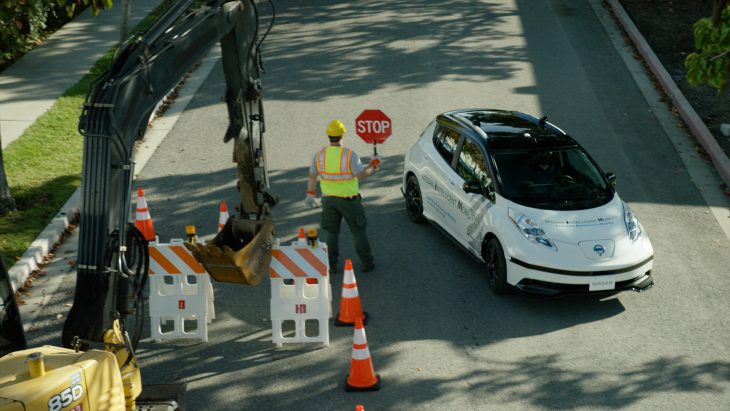
What then happens to passive radio consumption if everyone’s a passenger?
LAS VEGAS – The disruptive triangle of autonomous drive technologies, electric vehicles and connected cars means we will see more changes in the next 10 years than we did in the last 50, according to Nissan CEO Carlos Ghosn.
The auto exec gave a CES keynote where he announced several technologies and partnerships as part of the Nissan Intelligent Mobility blueprint for transforming how cars are driven, powered, and integrated into wider society. While the changes will be disruptive for automakers and others such as anyone who drives for a living, it will also usher in an era of tremendous opportunities believes Ghosn.
He said electric vehicles are becoming a viable option for more and more drivers and offer the most immediate, affordable way to reduce CO2 emissions and clean our air. This is made possible by the rapidly declining cost of batteries, improving driving range and an expanding charging infrastructure. (There is a ways to go as there were only about 130,000 electric or hybrid vehicles sold between November 2015 and November 2016 in the U.S., out of 17.4 million in total vehicle sales – or less than 1%.)
Automakers are also attempting to get consumers excited about increasingly connected, intelligent and personal cars and Ghosn said most new cars produced by 2025 will have connectivity to the Internet. Just as your mobile phone became a smartphone with its Internet connection, our cars are becoming smarter as well he says.
At this point it’s too soon to predict what will happen to linear in-car radio as all this technology is added to dashboards.
Today cars are already being equipped with danger-warning applications and active-safety features that depend on connectivity. This same connectivity opens up a wide range of in-car services and features. For example, drivers will also be able to instantaneously pay for parking or tolls with a simple touch of their dashboard screen (the city of Toronto is counting on tech like this in order to toll the Gardiner Expressway and Don Valley Parkway).
Similarly, autonomous drive features are starting to go into vehicles, a trend that has been led by Tesla and will continue over the next several years. This past summer, Nissan launched its new midsized Serena minivan in Japan with an optional system for single-lane use on highways
To shorten the time it will take for autonomous vehicles to get on the road safely, Nissan is adapting technology that NASA has used to remotely control robots in space, the new technology is called "Seamless Autonomous Mobility," or SAM. SAM utilizes artificial intelligence to determine if human intervention is required. Ghosn says this technology could potentially enable millions of driverless cars to co-exist with human drivers in an accelerated timeline.
(Ed note: This assumes consumers will want to cede control of a 4,000 pound object they are riding in at 100 km/h or so to a computer. To say nothing of what would happen when they might have to take control of their vehicle, and they are horribly unprepared and out of practice.)
"We invite others to join us, as well, from tech partners to e-commerce companies, ride-hailing and car-sharing platforms, and social entrepreneurs who can help us to test and develop new vehicles and services, and make sure everyone has access to the latest technologies and services that bring value to their lives," said Ghosn.
The CEO also announced that Nissan and Japanese Internet company DeNA will begin tests aimed at developing driverless vehicles for commercial services. The first phase of testing will begin this year in designated zones in Japan, with a focus on technology development. By 2020, Nissan and DeNA plan to expand the scope of their tests to include the commercial usage of driverless technology for mobility services in the Tokyo metropolitan area.
In addition to advancements in Nissan's autonomous driving strategy, Ghosn also announced plans to launch a new Nissan LEAF, with ProPILOT technology, enabling autonomous drive functionality for single-lane highway driving. This new LEAF will build on the company's leadership in electric vehicles, which includes having sold more than 250,000 Nissan LEAFs sold worldwide since 2010. Ghosn said the new LEAF is coming in the near future and represents the next chapter of Nissan Intelligent Power.
During his keynote Ghosn demonstrated how Microsoft's voice-activated Cortana digital assistant can be used in a car for tasks like scheduling a service appointment after the vehicle senses maintenance is needed. The data produced and collected by Cortana can also be used for machine learning in autonomous driving systems.
To support the policies and planning required to integrate these technologies into the cities around the world, Ghosn announced a new partnership with 100 Resilient Cities (100RC), a global non-profit working to help cities build resilience to physical, social and economic challenges.
If we get it right says Ghosn, the technology being developed and tested today eventually will provide for a world in which people are able to move about more efficiently, more safely and more cleanly, at lower cost and in different ways. It could improve the quality of daily life for billions of people.


